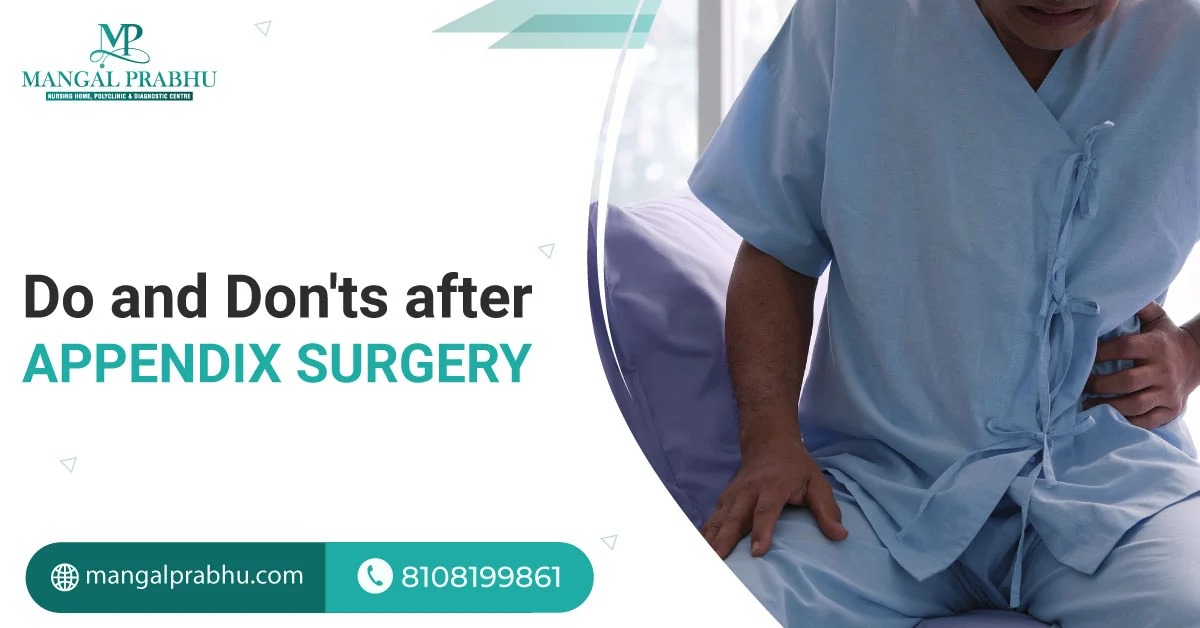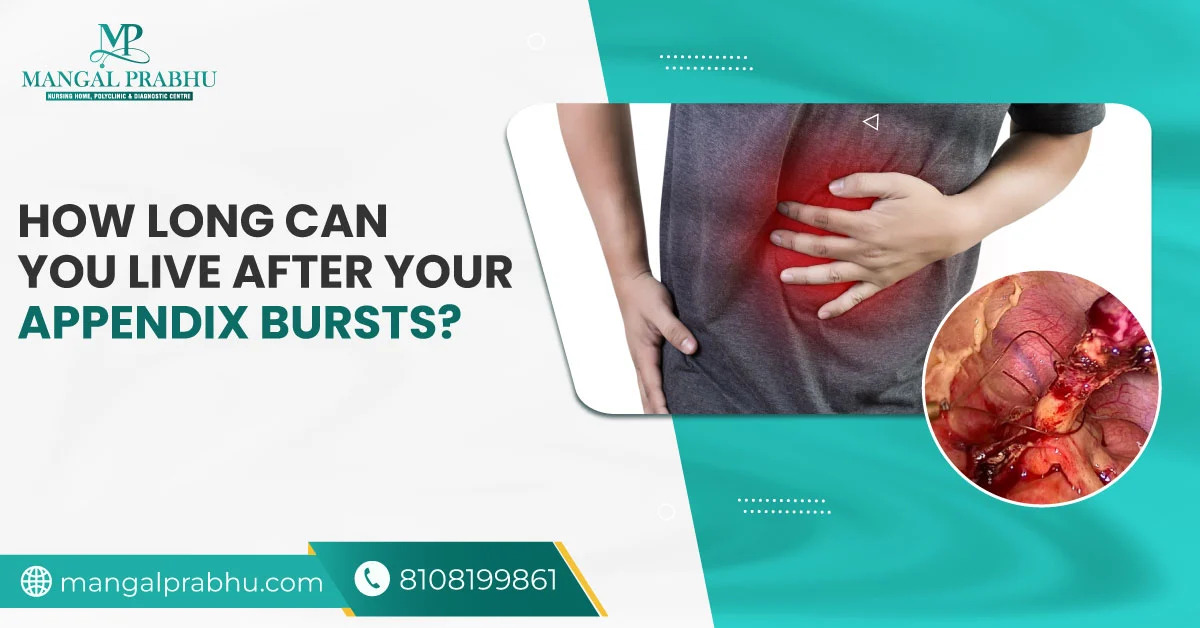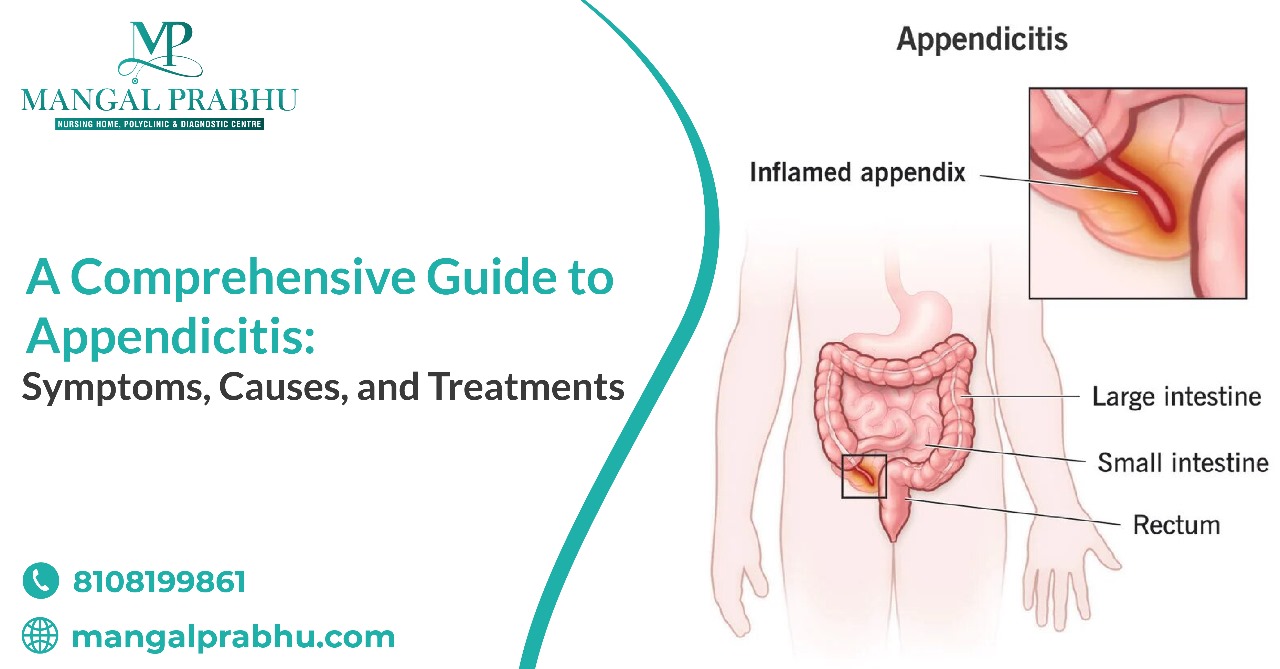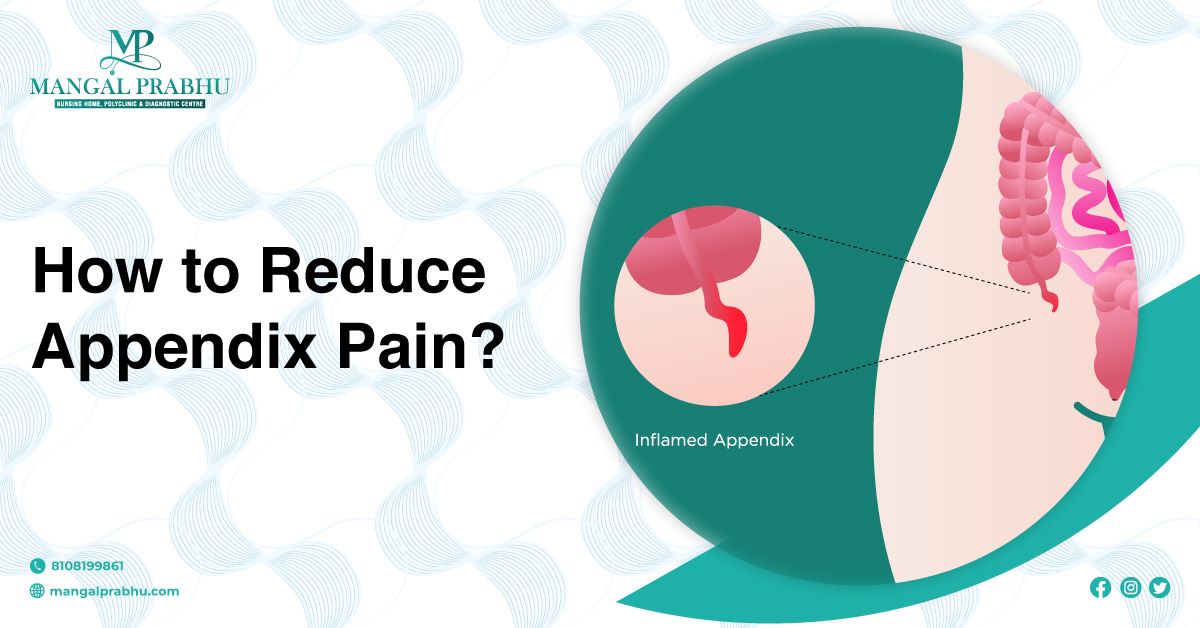
Do and Don’ts After Appendix Surgery
Located in the lower right side of the abdomen, the appendix is a small worm-like organ attached to your colon. An infection or an obstruction in the appendix can cause inflammation, requiring immediate surgical intervention. The surgery is called appendectomy and is carried out by a general surgeon in Navi Mumbai.
It’s considered an emergency in patients with a burst appendix, as the infection can spread to other parts of the body and become life-threatening. After surgery, you will stay in the hospital for a few days, especially if you had surgery for a ruptured appendix. Here are some dos and don’ts after appendix surgery for faster recovery.
Do’s after Appendix Surgery
a) Follow Your Doctor’s Instructions:
Your doctor will guide you during recovery. You may also need to schedule follow-up visits to ensure you are healing well.
b) Take Prescribed Medications:
Your surgeon will prescribe painkillers and antibiotics for the first few days. Take medication as prescribed by your doctor.
c) Maintain a Healthy Diet:
Start small with light foods, preferably liquid. Move to the soft solids, like mashed potatoes, mashed fruits, oatmeal, rice, yogurt, and scrambled eggs. Ask your doctor when it’s safe to eat normal food. Once you get the doctor’s approval, add more veggies and fruits, with proteins and omega-3 fatty acids, to your diet.
d) Get Plenty of Rest:
Like any surgery, recovery from appendectomy requires adequate rest. You should limit your physical activity and take 2-3 weeks off from work.Practice Light Physical Activity: Rest doesn’t mean you should go on bed rest and not move. Light physical activity, like walking, is an important part of your recovery after surgery. It helps prevent blood clots and other post-surgical complications.
Don’ts after Appendix Surgery
i) Avoid Strenuous Activities:
Do not put pressure on the surgical site, and avoid exercising or any strenuous physical activity for the first four weeks following appendectomy. Cycling, swimming, running, and all kinds of heavy exercises should be avoided during this period.
ii) Don’t Lift Heavy Objects:
Weight lifting should be avoided. Don’t lift anything heavier than 7-8 pounds until your doctor says it’s okay.
iii) Refrain from Consuming Alcohol:
Alcohol can delay your recovery, as it affects your immune function, increasing the risk of complications after surgery. Besides, alcohol can interfere with your pain relief and antibiotic medication.
iv) Avoid Smoking:
Likewise, smoking increases your risk of infection. It can constrict blood vessels, interfering with the oxygen supply to the tissues. This can affect post-surgical recovery.
v) Don’t Strain During Bowel Movement:
Eat a fiber-rich diet to prevent constipation. If necessary, you can ask your doctor to recommend a stool softener.
vi) Don’t Ignore Warning Signs of Complications:
If you notice pus or bleeding from the incision site accompanied by fever and vomiting, call your doctor immediately, as these might be signs of infection.
Conclusion
Recovery from appendix surgery in Navi Mumbai should take no longer than six weeks. Stay in touch with your doctor and update them about your healing. Eat small, frequent meals, stay hydrated, and sleep well.

How Long Can You Live After Your Appendix Bursts?
Located on the lower right section of your belly, the appendix is a small finger-like organ. It can become inflamed, often necessitating immediate surgical removal. Appendicitis can escalate rapidly, leading to swelling and pus formation inside your appendix. Fortunately, the appendix doesn’t play a vital role in your body and can be removed safely. It’s advisable to consult a qualified appendix surgeon in Navi Mumbai to discuss your treatment options.
What Happens When Your Appendix Bursts?
Appendicitis, inflammation of the appendix, is a medical emergency and requires immediate care. If left untreated for a long time, the inflamed appendix can burst, and the infection can spread throughout your body. It’s a life-threatening condition that requires immediate surgical removal of your appendix.
The risk of appendix burst increases with time. The longer you delay the treatment for appendicitis, the higher the risk of a ruptured appendix. A ruptured appendix occurs when an infection spreads outside the appendix. If bacteria enter the appendix, they start multiplying, causing swelling. The infection keeps escalating until the swollen appendix bursts and the pus oozes out into the abdomen.
Recovery and Survival Rates After a Burst Appendix
A burst appendix can have serious complications, some of which are life-threatening. The mortality rate of perforated appendicitis is 4.8 percent. Treatment for a ruptured appendix depends on where it has spread. If there’s an abscess, you must take antibiotics to drain it.
The best appendix treatment in Navi Mumbai is open surgery, which gives the surgeon a clear view of the infection and its severity. Recovery can take up to 6 weeks. Your doctor will provide instructions to speed up your recovery. For instance, you will be advised to avoid heavy lifting or strenuous exercise that can put excess pressure on the incision site.
The recovery can take longer if the doctor has inserted tubes into your abdominal cavity for abscess drainage.
Long-Term Effects and Complications
As mentioned earlier, the biggest complication of a ruptured appendix is peritonitis, a condition in which the bacteria from the appendix enter your abdominal cavity, causing severe symptoms like excess abdominal pain, fever, chills, fast breathing, and confusion.
The appendix ruptures between 48 and 72 hours after the inflammation. The condition usually causes pain in the lower abdomen, starting around the navel and settling in the lower abdomen. Other symptoms of appendicitis include:
- Bloating in your abdomen
- Difficulty passing gas
- Nausea and vomiting
- Pain in the belly while walking, climbing stairs, jumping, and practicing other physical activities.
A ruptured appendix can lead to sepsis or an abscess (a pocket of pus forming inside your abdominal cavity). The abscess needs to be drained through a tube inserted into your abdomen. Your doctor will prescribe antibiotics to clear the fluid.
If you have developed an abscess, your doctor will wait until it is drained completely before performing appendix removal surgery.
The burst appendix is an emergency. Your recovery and the survival rates for appendicitis depend on how soon you get the treatment. The condition requires quick diagnosis and immediate treatment to prevent complications.

Life After Appendix Removal
What is an Appendix?
The appendix is an enigmatic pouch hanging out in the gut, but sometimes people may experience a low rumble in their lower right abdomen that turns into a silent but painful tantrum. Turns out, it’s gotten inflamed – a condition known as appendicitis and an individual may need to consider a permanent solution for it which is surgery from the best Appendix Surgeon in Navi Mumbai at Mangal Prabhu Hospital. However, this guide will illuminate the path ahead, exploring the surgery itself, what life was like before and after, and the journey towards physical recovery.
Appendectomy Procedure
A) Why removal is necessary
When the appendix becomes inflamed, causing appendicitis, its peaceful existence abruptly ends. Appendectomy is a crucial surgical procedure in the medical attention of the appendix. Minimally invasive surgery is the way to pain relief and a renewed lease on life.
B) Surgical process and recovery timeline
Appendectomy, often performed laparoscopically through tiny incisions, banishes the troublesome appendix. However, the recovery duration after this surgical procedure may differ depending on an individual’s health. Within days, an individual can easily be discharged from the hospital, ready to embark on the next act of recovery.
Life Before vs. After
a) Symptoms leading to the removal
If an individual feels a sharp or dull pain in their lower right abdomen, swelling of the abdomen, diarrhoea, etc, then the doctor may consult for appendix removal.
b) Impact on daily life pre-surgery
Life with a rebellious appendix is like navigating a minefield—every step is fraught with discomfort and uncertainty. From dodging pain to juggling responsibilities, it may influence the overall well-being of an individual. You may miss out on activities you love, and feel trapped by your own body without appendix removal.
c) Changes post-removal
Most people experience a marked improvement in their post-surgery life. No more worrying about an inflamed appendix, no more pain disrupting your days after appendicitis treatment in Navi Mumbai at Mangal Prabhu Hospital. However, don’t expect complete amnesia from your body. There might be some initial soreness around the incision, fatigue from the ordeal, and even dietary adjustments as your digestive system regains its strength.
Physical Recovery
I) Post-surgery care
Post-surgery care is foremost in this recovery quest. Keeping it clean and dry with gentle cleaning helps prevent unwanted visitors like infection. Besides, cleaning an individual must take proper medication for pain management and consider rest and replenishment as the body needs rest to heal.
ii) Managing pain and returning to activities
Physical recovery after surgery is like gradually unlocking new levels in your life. Use pain management medication and adopt other approaches as suggested by the doctor. Take a break and rest and try a slightly more challenging activity.
Conclusion
The journey to medical attention does not end even after appendix removal. After the surgical procedure, an individual may need to rebuild their body and strength and emerge stronger than ever. It is like a side quest in your recovery RPG, filled with challenges and rewards.

How to Diagnose Appendicitis?
The appendix is a small tube-like organ attached to your large intestine. It doesn’t perform any critical function but can get clogged or inflamed. Appendicitis is a serious condition that requires immediate treatment, preferably surgery. Appendicitis treatment in Navi Mumbai is for patients with severe abdominal pain in the lower abdomen. The condition can lead to a swollen appendix, which might eventually burst and become a life-threatening condition.
Causes and Symptoms of Appendicitis
Appendicitis occurs because of the bacterial overgrowth in the appendix. The bacteria from your large intestine can travel to the appendix, infect it, and clog the tube. Here are the symptoms of appendicitis:
- Abdominal pain around the belly button accompanied by nausea and vomiting
- Pain that’s persistent and keeps worsening
- Fever
- Bloated abdomen
- Frequent urination
- Diarrhea
If left untreated for a long time, your appendix can burst and the infection can spread throughout your body.
Diagnosing Appendicitis
The most common sign of appendicitis is pain in the abdomen, which shifts toward your appendix (lower part). Your healthcare provider will ask about your history of symptoms and run a few tests to diagnose appendicitis.
A) Physical Exam
Physical exam, i.e. putting pressure on the abdomen will worsen your pain. This happens because of the inflamed peritoneum. A digital rectal exam is another procedure that helps your doctor identify an inflamed appendix.
B) Imaging Tests
Imaging tests, like abdominal ultrasound and an X-ray, can help diagnose appendicitis easily. They will conduct further imaging tests, like a CT scan or an MRI, for a more accurate diagnosis. If the symptoms are confusing, imaging tests are used to identify the cause of pain.
C) Blood Tests
Blood tests help diagnose an infection in your body by checking the white blood cell count. The increased number of white blood cells indicates an active infection in your body.
In addition to these tests, the doctor will order a urinalysis to rule out the possibility of an infection of the bladder, urethra, and kidneys. These conditions can produce a similar range of symptoms. Likewise, the doctor will recommend a pregnancy test for women of their childbearing age.
Also Read: How to Reduce Appendix Pain?
Treatment of Appendicitis
The doctor for appendicitis surgery in Navi Mumbai will recommend an invasive surgical procedure to remove the inflamed appendix. That’s the only treatment for appendicitis. But before that, they will prescribe antibiotics to reduce infection. They will also conduct the above-listed imaging tests to evaluate the severity of the infection.
i) Medication
Appendicitis can be treated with antibiotics, but it’s unlikely that it will resolve with the medication alone. Your healthcare provider might recommend medication to treat the infection before they perform surgery. Note that appendicitis doesn’t resolve on its own. It will most likely return if the appendix is left intact and the pain and symptoms are resolved with medication.
ii) Surgery
Appendectomy is a surgical procedure used to remove the appendix either through an open surgery or a laparoscopic procedure. If you have had a laparoscopic procedure, you will recover faster and get discharged within a day or two.
Conclusion
In conclusion, it is critical to identify the signs of appendicitis and seek immediate medical assistance. To precisely diagnose the ailment, the diagnostic process includes physical examinations, imaging studies, and blood testing. Antibiotics can be helpful, but surgery is the best course of action; open or laparoscopic operations are two alternatives. Prompt intervention is essential to avoid complications, and following the prescribed treatment regimen guarantees a full recovery and return to health.

A Comprehensive Guide to Appendicitis: Symptoms, Causes, and Treatments
Introduction to Appendicitis
Appendicitis is a medical emergency when the appendix, a small, finger-like organ in the lower right side of the abdomen, becomes inflamed and infected. This condition can be extremely painful and, if left untreated, may lead to severe complications. This guide will explore the symptoms, causes, treatments, and prevention of appendicitis. If you’re in Navi Mumbai and require appendicitis treatment, it’s crucial to consult a skilled general surgeon in Navi Mumbai, such as those at Mangal Prabhu Hospital, who can provide timely and effective care.
Symptoms of Appendicitis
Recognizing the symptoms of appendicitis is essential for early diagnosis and prompt treatment. Common symptoms include:
i) Abdominal Pain
The most typical sign of appendicitis is a sharp pain that starts around the navel and gradually moves to the lower right abdomen. This pain often intensifies over time.
ii) Nausea and Vomiting
Many individuals with appendicitis experience nausea and may vomit due to the pain and discomfort.
iii) Loss of Appetite
A sudden loss of appetite is common when the appendix is inflamed.
iv) Fever
Appendicitis can lead to a low-grade fever, which may become more severe as the condition progresses.
v) Constipation or Diarrhea
Changes in bowel habits can occur, often with the patient experiencing either constipation or diarrhea.
vi) Abdominal Tenderness
The area around the appendix becomes tender and painful to the touch.
vii) Inability to Pass Gas
Some people with appendicitis find it difficult to pass gas.
Also Read: How To Reduce Appendix Pain?
Causes of Appendicitis
The exact cause of appendicitis is not always clear, but it is believed to result from one or more of the following factors:
a) Obstruction
Most cases of appendicitis are associated with a blockage in the appendix, often caused by stool, foreign objects, or an infection.
b) Infection
Infections within the digestive tract can lead to inflammation of the appendix.
c) Enlarged Lymphoid Follicles
Lymphoid tissue in the appendix can enlarge and lead to obstruction.
Treatments for Appendicitis
The standard treatment for appendicitis is surgical removal of the inflamed appendix, a procedure known as an appendectomy. This surgery can be performed using either traditional open or laparoscopic surgery, which is less invasive and typically results in a quicker recovery.
In some cases, if the appendix has formed an abscess (a pocket of infection), it may be drained before removing it surgically. It may involve a temporary drainage tube placement.
Prompt surgical intervention is crucial to prevent the appendix from rupturing, which can lead to severe complications, including peritonitis, a life-threatening infection of the abdominal lining.
Prevention of Appendicitis
- While appendicitis cannot always be prevented, some strategies may reduce the risk:
- Consuming a diet high in fiber may help prevent blockages in the appendix.
- Staying well-hydrated can help maintain healthy bowel function.
- Regular physical activity can promote overall digestive health.
- Practicing good hygiene, including regular handwashing, may reduce the risk of infection.
Conclusion
Appendicitis is a painful condition that requires prompt medical attention. You must consult a healthcare professional immediately if you experience symptoms like abdominal pain, nausea, vomiting, or fever. At Mangal Prabhu Hospital in Navi Mumbai, you can find experienced general surgeons who specialize in appendicitis treatment in Navi Mumbai. Early diagnosis and timely appendectomy are critical to a successful recovery and preventing complications. By understanding the symptoms, causes, and treatments of appendicitis, you can take the necessary steps to protect your health and well-being.

How to Reduce Appendix Pain?
The appendix is a small pouch attached to your intestine at the lower right side of your abdomen. The appendix can get blocked, causing the bacteria inside it to multiply rapidly, filling it with pus. As a result, it can get inflamed, requiring surgery.
Appendicitis can be life-threatening if the appendix bursts, spreading the bacteria to the abdominal cavity. You must get immediate appendix removal treatment in Navi Mumbai to prevent complications. Read on to learn more about appendicitis, when you need an appendectomy treatment, and how to relieve the appendix pain.
Examining the Symptoms of Appendix Pain
Appendicitis pain is extremely severe. It starts with mild cramps in your upper and lower abdomen, especially around the belly button. The pain is often described as a sharp and sudden pinch in the abdomen.
It gets worse when you move. The pain is so severe that you won’t be able to fall or stay asleep at night. The worst part is appendicitis requires almost immediate medical attention, i.e. within 24-48 hours. The pain keeps getting worse every hour. Here are some other symptoms of appendicitis.
- Loss of appetite
- Nausea and vomiting
- Fever
- Indigestion
- Diarrhea
If you feel constipated, do not use an enema, laxatives, or any medication or tool to pass the bowel movement. This can burst your appendix.
Also Read: Understanding The Different Types Of Surgeries: A Guide For Patients
Ways to Help Reduce Appendix Pain
Unfortunately, you cannot get rid of the appendicitis pain, as it tends to get worse over time. Painkillers might help for a while, but that’s only until their effect lasts. It’s best to see a general surgeon in Navi Mumbai and get an appendectomy—a surgery to remove your appendix.
Since the appendix is not an essential organ and one can easily live without it, having it surgically removed is the only treatment option for appendicitis. It’s usually performed as an emergency treatment.
Here’s what you should do to avoid complications after the surgery:
1. Limit Strenuous Activities:
Do not practice any strenuous activity that puts unnecessary pressure on your abdomen or the site of the operation. If the surgery was performed laparoscopically, you can start moving 3-4 days after the operation, however, open surgery involves a longer recovery period.
2. Use Support When Moving:
Place a soft pillow on your abdomen and hold it gently when you cough, laugh, or move.
3. Contact Your Doctor:
If you still feel sharp or mild pain, contact your doctor immediately to seek medical help.
4. Rest:
Take leave from work or your classes for one week. You need rest post-surgery to speed up the healing. Take short walks initially. You can return to work when you feel alright. It’s best to talk to your doctor about when you can resume your work. Avoid strenuous activities for at least a month, so that your body can heal faster.
Conclusion
Appendicitis is an emergency medical condition that requires immediate treatment. If you notice the above-mentioned symptoms, contact a doctor immediately. Usually, people don’t have much time to prepare for appendectomy, as the surgery is an emergency treatment that’s performed during diagnosis.
